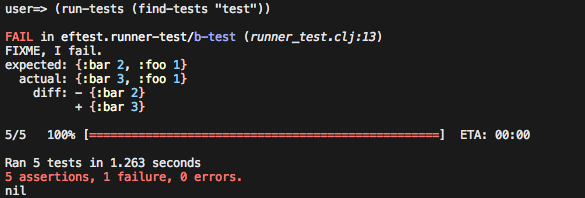Eftest is a fast and pretty Clojure test runner.
To install, add the following to your project :dependencies:
[eftest "0.3.2"]
Alternatively, if you just want to use Eftest as a lein test
replacement, add the following to your project :plugins:
[lein-eftest "0.3.2"]
When all the tests pass, it looks like this:
When a test fails, it looks like:
And when a test throws an exception, it looks like:
Eftest has two main functions: find-tests and run-tests.
The find-tests function searches a source, which can be a namespace,
directory path, symbol, var, or a collection of any of the previous.
It returns a collection of test vars found in the source.
The run-tests function accepts a collection of test vars and runs
them, delivering a report on the tests as it goes.
Typically these two functions are used together:
user=> (require '[eftest.runner :refer [find-tests run-tests]])
nil
user=> (run-tests (find-tests "test"))
...The above example will run all tests found in the "test" directory.
By default Eftest runs tests in parallel, which can cause issues with
tests that expect to be single-threaded. To disable this, set the
:multithread? option to false:
user=> (run-tests (find-tests "test") {:multithread? false})Alternatively, you can add the :eftest/synchronized key as metadata
to any tests you want to force to be executed in serial:
(deftest ^:eftest/synchronized a-test
(is (= 1 1)))Or you can synchronize the entire namespace:
(ns ^:eftest/synchronized foo.core-test
(:require [clojure.test :refer :all]
[foo.core :refer :all]))You can also change the reporting function used. For example, if you want a colorized reporter but without the progress bar:
user=> (run-tests (find-tests "test") {:report eftest.report.pretty/report})Or JUnit output:
user=> (run-tests (find-tests "test") {:report clojure.report.junit/report})Or maybe you just want the old Clojure test reporter:
user=> (run-tests (find-tests "test") {:report clojure.test/report})If you want to redirect reporting output to a file, use the
eftest.report/report-to-file function:
user=> (require '[clojure.report :refer [report-to-file]])
nil
user=> (require '[clojure.report.junit :as ju])
nil
user=> (run-tests (find-tests "test") {:report (report-to-file ju/report "test.xml")})To use the Lein-Eftest plugin, just run:
lein eftestYou can customize the reporter and set the concurrency by adding an
:eftest key to your project map:
:eftest {:multithread? false
:report clojure.report.junit/report
;; You can optionally write the output to a file like so:
:report-to-file "target/junit.xml"}Leiningen test selectors also work. With namespaces:
lein eftest foo.bar-test foo.baz-testAnd with metadata keywords:
lein eftest :integrationCopyright © 2017 James Reeves
Distributed under the Eclipse Public License either version 1.0 or (at your option) any later version.


